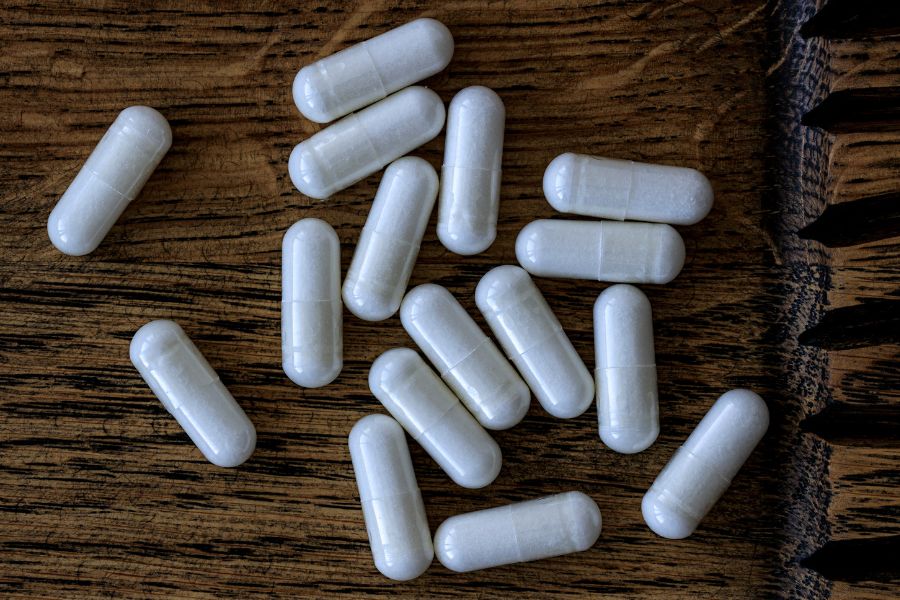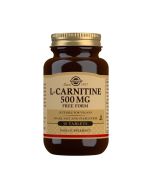
Top Benefits of taking L-Carnitine
What is L-Carnitine?
L-Carnitine is an amino acid that is naturally produced in the body. It’s synthesised from the essential amino acids lysine and methionine in the liver and kidneys. L-Carnitine plays a crucial role in the transport of long-chain fatty acids into the mitochondria, the energy-producing organelles within cells. Long-chain fatty acids cannot directly cross the mitochondrial membrane, so they require L-Carnitine to be transported across. It acts as a carrier molecule, forming an ester bond with fatty acids and facilitating their entry into the mitochondria.
Once inside the mitochondria, L-Carnitine helps facilitate the process of fat oxidation, where fatty acids are broken down to produce energy. The fatty acids are enzymatically converted into acetyl-CoA, which enters the Krebs cycle (also known as the citric acid cycle or TCA cycle) to generate ATP, the primary energy source for cells.
It can be obtained in small amounts by eating animal products like meat and also dairy products. As a result, individuals who follow a vegan diet or those with specific genetic conditions may have difficulty producing or acquiring sufficient levels of L-Carnitine. In such cases, the use of L-carnitine supplements may be necessary to ensure an adequate intake.
What are the benefits of L-Carnitine?
Burns fat
As mentioned above, L-Carnitine enhances the body’s ability to burn fat by breaking down long-chain fatty acids into energy within the mitochondria. It has also been associated with the reduction of visceral fat which is the fat that accumulates around the organs in the abdominal cavity. Excessive visceral fat is associated with an increased risk of various health conditions, including cardiovascular disease and type 2 diabetes. While research on the direct impact of L-Carnitine specifically on visceral fat is limited, L-Carnitine may indirectly contribute to its reduction through several mechanisms:
- Increased fat oxidation: L-Carnitine plays a crucial role in the transport of fatty acids into the mitochondria, where they can be oxidized for energy. By enhancing fat oxidation, L-Carnitine may help promote the utilization of stored fat, including visceral fat, as an energy source. This process may contribute to the reduction of overall body fat, including visceral fat.
- Improved metabolism: As the capacity for your body to burn fat rises so do your energy levels and with this energy comes a higher metabolic rate, which refers to the number of calories burned at rest. By increasing metabolic rate, L-Carnitine may help support overall fat loss, including the reduction of visceral fat.
- Insulin sensitivity: L-Carnitine has been associated with improved insulin sensitivity, allowing cells to better respond to insulin and utilize glucose effectively. This may help prevent excess glucose from being converted into fat and stored, including as visceral fat.
- Enhanced exercise performance: Regular exercise, including both cardiovascular and strength training activities, can contribute to overall fat loss, including the reduction of visceral fat. L-Carnitine has been studied for its potential to improve exercise performance and increase the utilization of fatty acids as an energy source during physical activity. By enhancing exercise capacity, L-Carnitine may indirectly support the reduction of visceral fat through increased physical activity.
Aids the immune system
The role of L-Carnitine in supporting the immune system is not as extensively studied as its other functions. However, some research suggests that L-Carnitine may have potential benefits for immune function through several mechanisms:
- Antioxidant properties: L-Carnitine exhibits antioxidant properties, which can help reduce oxidative stress and protect cells from damage caused by free radicals. By minimizing oxidative damage, L-Carnitine may support the proper functioning of immune cells.
- Modulation of immune response: Some studies suggest that L-Carnitine may modulate immune responses, including the production of certain cytokines and immune cells. For example, L-Carnitine has been shown to enhance the proliferation and activity of natural killer (NK) cells, which are important in the body's defence against viruses and tumours. It may also influence the production of certain immune signalling molecules.
- Gut health support: The gut microbiota plays a crucial role in immune function, and L-Carnitine has been found to have potential benefits for gut health. By supporting a healthy gut microbiota composition, L-Carnitine may indirectly contribute to immune system modulation and overall immune function.
Brain function and mood enhancement
L-Carnitine has been studied for its potential effects on brain function and mood enhancement although more research is needed to fully understand its mechanisms of action in these areas. Here are some ways in which L-Carnitine may support brain function and mood:
- Enhanced cognitive function: The brain requires a substantial amount of energy to function optimally. By facilitating energy production, L-Carnitine may support overall brain function and cognitive performance.
- Neuroprotection: L-Carnitine exhibits antioxidant properties and has been shown to protect against oxidative stress and damage in the brain. Oxidative stress can contribute to the development of neurodegenerative disorders and impair cognitive function. L-Carnitine's antioxidant effects may help preserve brain health and potentially reduce the risk of age-related cognitive decline.
- Acetylcholine synthesis: L-Carnitine has been suggested to enhance acetylcholine synthesis in the brain. Acetylcholine is a neurotransmitter involved in various cognitive functions, including memory, attention, and learning. By supporting acetylcholine production, L-Carnitine may promote cognitive performance and memory retention.
- Mood regulation: Some studies have explored the potential mood-enhancing effects of L-Carnitine. It has been proposed that L-Carnitine may influence neurotransmitter systems, such as serotonin and dopamine, which play key roles in mood regulation. By modulating these neurotransmitters, L-Carnitine may have a positive impact on mood and emotional well-being.
L-Carnitine for diabetes
Multiple studies have been done to assess the impact of L-Carnitine on diabetes. Here are the properties that help L-carnitine to treat and control diabetes:
- Improves glucose metabolism: Increases glucose uptake and utilisation in cells. May enhance insulin sensitivity. Allowing cells to better respond to insulin and effectively utilise glucose for energy
- Enhanced insulin action: Increase insulin receptor activity and promotes the translocation of glucose transporters to the cell membrane, facilitating the uptake of glucose into cells. Helps regulate blood sugar levels and improves glycaemic control
- Reduces complications: Diabetes is associated with carious complications including neuropathy (nerve damage) and nephropathy (kidney damage). Some studies have indicated that L-Carnitine supplementation may help alleviate symptoms and reduce the risk of these complications by enhancing nerve function and protecting against oxidative stress
- Cardiovascular health support: Individuals with diabetes are at a higher risk of cardiovascular diseases. L-Carnitine has been studied for its potential cardiovascular benefits, including reducing triglyceride levels, improving lipid profile and supporting heart function. By promoting fat metabolism and reducing lipid accumulation, L-Carnitine may help manage cardiovascular risk factors in people with diabetes.
Key Takeaways:
- Adequate supplementation of L-Carnitine is crucial for the conversation of fatty acids into energy, particularly for individuals who may not be obtaining sufficient amounts through dietary sources
- L-Carnitine offers a wide range of health benefits that can enhance the well-being of individuals of all age groups.
- In addition to its positive effects on physical health, L-Carnitine also has beneficial effects on mental well-being and energy levels.






